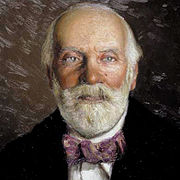
Armando Palacio Valdés
Encyclopedia

Spain
Spain , officially the Kingdom of Spain languages]] under the European Charter for Regional or Minority Languages. In each of these, Spain's official name is as follows:;;;;;;), is a country and member state of the European Union located in southwestern Europe on the Iberian Peninsula...
novelist and critic.
Biography
Valdés was born at Entralgo in the province of AsturiasAsturias
The Principality of Asturias is an autonomous community of the Kingdom of Spain, coextensive with the former Kingdom of Asturias in the Middle Ages...
on the October 4, 1853.
His first writings were printed in the Revista Europea. These were pungent essays, remarkable for independent judgment and refined humour, and found so much favor with the public that the young beginner was soon appointed editor of the Revista. The best of his critical work is collected in Los Oradores del Ateneo (1878), Los Novelistas españoles (1878), Nuevo viaje al Parnaso and La Literatura en 1881 (1882), this last being written in collaboration with Leopoldo Alas.
In 1881 he published a novel, El señorito Octavio, which shows an uncommon power of observation, and the optimistic promise of better things to come. In Marta y Maria (1883), a portrayal of the struggle between religious vocation and earthly passion, somewhat in the manner of Valera
Juan Valera y Alcala Galiano
Juan Valera y Alcalá-Galiano , was a Spanish realist author, writer and political figure.He was born at Cabra, in the province of Córdoba, and was educated at Málaga and at the University of Granada, where he took his degree in law, and then entered upon a diplomatic career...
, Palacio Valdés achieved a very popular triumph which placed him in the first rank of contemporary Spanish novelists.
EL Idilio de un enfermo (1884), a most interesting fragment of autobiography
Autobiography
An autobiography is a book about the life of a person, written by that person.-Origin of the term:...
, has scarcely met with the recognition which it deserves: perhaps because the pathos of the story is too unadorned. The publication of Peredas Sotileza is doubtless responsible for the conception of José (1885), in which Palacio Valdés gives a realistic picture of the manners and customs of seafaring folk
Folk
The English word Folk is derived from a Germanic noun, *fulka meaning "people" or "army"...
, creates the two convincing characters whom he names José and Leonarda, and embellishes the whole with passages of animated description barely inferior to the finest penned by Pereda
José María de Pereda
José María de Pereda was one of the most distinguished of modern Spanish novelists....
himself.
A collection of his short stories appeared in English
English language
English is a West Germanic language that arose in the Anglo-Saxon kingdoms of England and spread into what was to become south-east Scotland under the influence of the Anglian medieval kingdom of Northumbria...
translation in 1935.
Works
- Semblanzas literarias (1871)
- Los oradores del Ateneo (1878)
- El nuevo viaje al Parnaso (1879)
- La literatura en (1881), with Leopoldo Alas
- El señorito Octavio (1881)
- Marta y María (1883)
- Aguas fuertes (1884)
- El idilio de un enfermo (1884)
- José (1885)
- Riverita (1886)
- Maximina (1887)
- El cuarto poder (1888)
- La hermana San Sulpicio (1889)
- La espuma (1890)
- La espuma (1891)
- La fe (1892)
- El maestrante (1893)
- El Orígen del Pensamiento(1893)
- Los majos de Cádiz (1896)
- La alegría del capitán Ribot (1899) ("The Joy of Captain Ribot", 1900)
- Tristán o el pesimismo (1906)
- La aldea perdida (1911)
- Los papeles del doctor Angélico (1911)
- Años de juventud del doctor Angélico (1918)
- La novela de un novelista (1921)
- Cuentos escogidos (1923)
- La hija de Natalia (1924)
- El pájaro en la nieve y otros cuentos (1925)
- Santa Rogelia (1926)
- Los cármenes de Granada (1927)
- Testamento literario (1929)
- Sinfonía pastoral (1930)
- El gobierno de las mujeres (1931)
- Obras completas (1935)
- Álbum de un viejo (1940)
- El Crimen en Calle de la Perseguida (Unknown)
In English
- Literary realismLiterary realismLiterary realism most often refers to the trend, beginning with certain works of nineteenth-century French literature and extending to late-nineteenth- and early-twentieth-century authors in various countries, towards depictions of contemporary life and society "as they were." In the spirit of...
: General vision of the movement - Spanish literatureSpanish literatureSpanish literature generally refers to literature written in the Spanish language within the territory that presently constitutes the state of Spain...
: Evolution of Spanish literature

